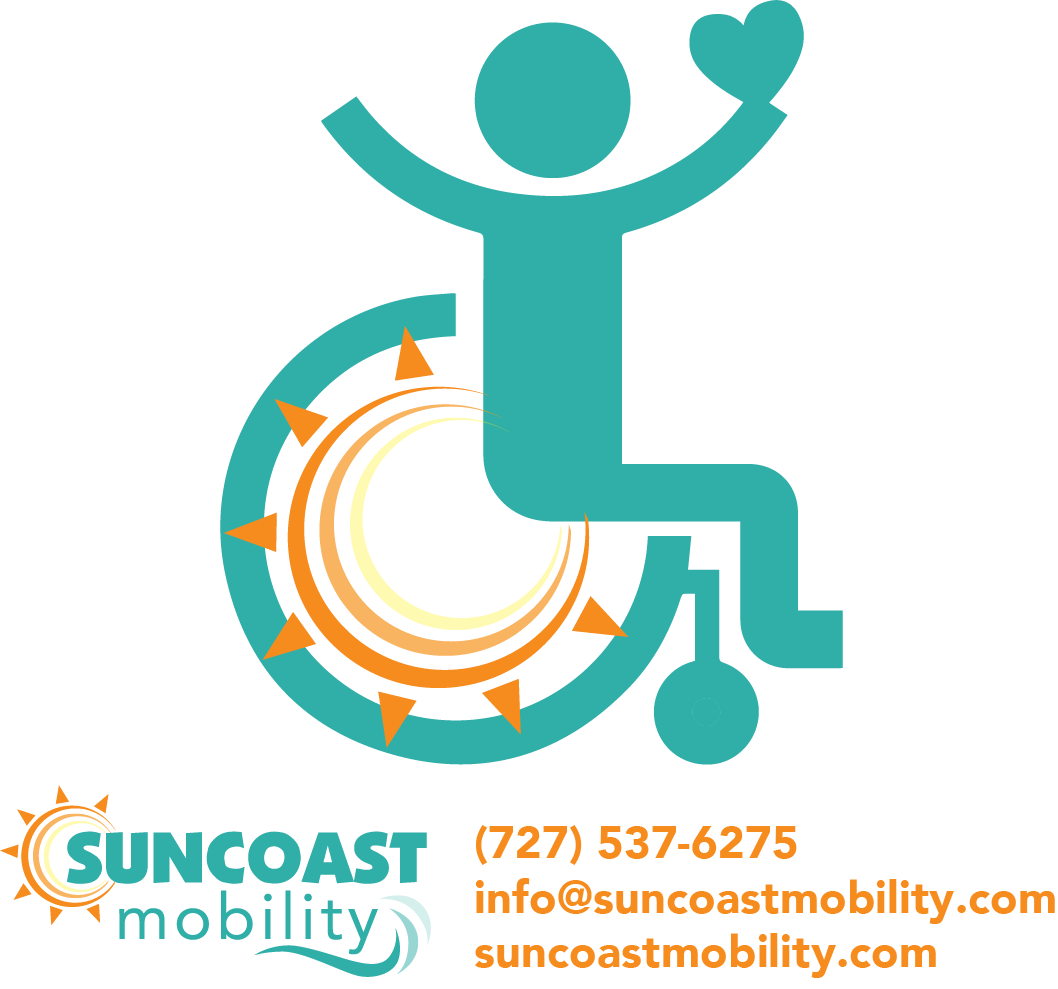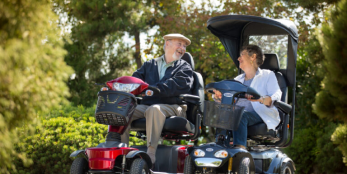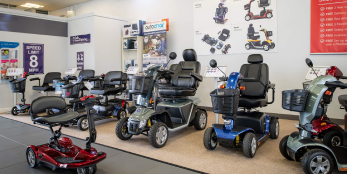Table of contents
More Than Mobility: The Emotional and Social Impact of Mobility Scooter
Mobility scooters are often viewed primarily as practical tools—essential devices that help individuals with limited mobility regain physical freedom. While that function is undeniably important, it only scratches the surface of what these remarkable machines offer. In reality, the benefits of mobility scooters go far beyond movement—they touch nearly every aspect of a person’s emotional and social well-being.
For many people living with mobility challenges —whether due to aging, chronic conditions, injury, or disability—the loss of independence can be deeply disheartening. Everyday experiences like meeting friends for coffee, strolling through the park, or attending a family event can become overwhelming or even impossible without assistance. This often leads to feelings of isolation, frustration, and decreased self-worth.
That’s where mobility scooters truly shine. Beyond their wheels and mechanical features, they serve as powerful tools for restoring independence, rebuilding confidence, and reconnecting individuals with their communities. These devices don’t just help people get around—they help them reclaim their place in the world. Whether it’s going shopping solo, attending social events, or simply enjoying the outdoors again, the emotional and social impact of a mobility scooter can be truly life-changing.
In this article, we’ll explore the often-overlooked emotional and social benefits of mobility scooters, and why they deserve recognition not just as medical aids, but as pathways to a fuller, more connected life.
Regaining a Sense of Independence
One of the most difficult consequences of limited mobility —whether due to aging, injury, or a chronic health condition —is the loss of personal independence. For many, the inability to do everyday things like grocery shopping, meeting friends, or even taking a peaceful walk in the park can lead to feelings of helplessness, frustration, and social withdrawal. This sudden reliance on others for basic tasks can feel like a loss of autonomy and identity, impacting both mental health and overall quality of life.
This is where one of the most powerful benefits of mobility scooters comes into play: the ability to reclaim personal freedom. By providing a safe, stable, and easy-to-use mode of transportation, mobility scooters give users the ability to move through their day without waiting for assistance or depending on others. Tasks that once required planning, coordination, or physical help—like running errands, going to the pharmacy, visiting the local library, or attending religious services—suddenly become achievable and even enjoyable again.
More importantly, this return to independence brings with it a renewed sense of self-worth. Many scooter users report feeling empowered, more confident, and less anxious about leaving the house. Simply knowing they can come and go as they please has a significant emotional impact, often helping to reduce stress and depression linked to isolation or inactivity.
Over time, this autonomy builds momentum. Individuals may begin to take on more social opportunities, explore new places, and reconnect with parts of life they had been missing. For some, it’s about being able to pick up their own mail. For others, it’s about joining a community center again or walking their dog in the neighborhood. No matter how big or small the task, the emotional boost from being able to say, “I can do this on my own” is a reminder of their capability—and it’s a key reason why regaining independence is one of the most life-changing benefits of mobility scooters .


Boosting Confidence and Self-Esteem
Along with regaining independence comes something equally valuable— confidence. Many people who begin using mobility scooters report feeling more self-assured, empowered, and comfortable navigating daily life. Whether it’s going out in public without the fear of falling, entering a crowded space with ease, or simply knowing they can keep up with family during outings, scooters can significantly boost a person’s sense of control, dignity, and personal freedom.
This newfound confidence often leads to a shift in mindset. Users may begin to feel more optimistic about what they can do rather than what they can’t. As a result, they’re more willing to try new things, say yes to social invitations, attend community events, or even travel —opportunities they might have once declined due to anxiety or physical limitations.
In this way, a mobility scooter becomes much more than a device for transportation—it becomes a gateway to a fuller, richer life . It encourages people to reengage with the world around them on their own terms, boosting not just mobility, but also emotional resilience , self-esteem , and overall well-being .
Strengthening Social Connections
Social isolation is a significant concern for individuals with mobility challenges. Studies show that limited mobility is often linked to loneliness, depression, and even cognitive decline. One of the most meaningful benefits of a mobility scooter is the ability to reconnect with friends, family, and the community.
With easier access to social spaces—cafés, shopping centers, parks, and places of worship—users can participate in events and routines that bring joy and companionship. They are more likely to engage in conversation, attend group gatherings, and maintain important relationships.
In some cases, users even form new friendships through their shared experiences as scooter users. Local support groups, senior centers, and online communities offer a place where people can bond over similar challenges and triumphs.
Encouraging Outdoor Activity and Mental Health
Spending time outdoors has been proven to improve mental health, reduce stress levels, and enhance overall emotional well-being . Exposure to sunlight, fresh air, and natural surroundings has a measurable effect on mood and energy, promoting relaxation and even improving sleep. Unfortunately, for individuals with mobility challenges, simply stepping outside can be difficult—or even dangerous—without the right equipment. Uneven sidewalks, long walking distances, and physical fatigue can all become barriers to enjoying the outdoors.
This is where one of the most underrated benefits of mobility scooters truly shines. By providing a stable, reliable, and comfortable way to get around, mobility scooters eliminate many of the physical obstacles that keep people indoors.
Whether it’s a peaceful ride through a neighborhood park, a scenic cruise along a boardwalk, or simply rolling through a local outdoor market, scooters make it much easier for users to engage with their surroundings. These experiences offer not only physical refreshment but also a deep emotional boost —helping users feel more grounded, connected, and uplifted.
Having the freedom to go for a ride whenever the mood strikes—without needing assistance—helps reinforce a sense of autonomy and self-reliance. It also helps combat the effects of cabin fever, and may even reduce symptoms of seasonal depression, particularly during the colder months when people tend to isolate.
Ultimately, mobility scooters don’t just offer a way to get around—they open the door to mental clarity , emotional balance , and the simple but profound joy of being outside.
Supporting Caregivers and Family Relationships
While mobility scooters are primarily designed to assist individuals with limited movement, their benefits extend far beyond the user to positively impact family members and caregivers as well. When a loved one gains greater independence and mobility, it often results in significantly reduced stress, fatigue, and burnout for those who provide daily support and care.
Instead of caregivers dedicating most of their time and energy to managing transportation or offering physical assistance, they can shift their focus to sharing more meaningful moments together. This means spending quality time —engaging in conversations, enjoying activities, or simply relaxing—rather than constantly worrying about logistics and practical challenges. This change often fosters healthier, more balanced, and emotionally fulfilling relationships between caregivers and their loved ones.
Within families, mobility scooters help older adults or those with mobility challenges remain active participants in important life events—such as graduations, weddings, and family reunions —without being sidelined or requiring extensive accommodations. Being able to fully engage in these special occasions nurtures emotional bonds and helps seniors feel valued, included , and emotionally connected to their family and community.
This sense of inclusion and active participation benefits everyone involved, creating shared memories and strengthening the support network that is vital for long-term well-being.
Promoting a Positive Identity
For some people, the transition to using a mobility aid can be an emotionally complex and challenging experience. Initially, many may associate the need for a scooter with aging, illness, or vulnerability, which can trigger feelings of loss, frustration, or even embarrassment. Accepting the change often requires a shift in mindset—a process that takes time and emotional adjustment.
However, over time, many users come to view their mobility scooter not as a symbol of limitation, but as a powerful emblem of strength, resilience, and self-sufficiency. Modern mobility scooters have evolved significantly in design and functionality, featuring sleek, stylish frames, customizable options, and vibrant colors that allow users to express their personality and style. This attention to aesthetics helps users feel more confident and proud of how they present themselves in public.
Feeling stylish, visible, and empowered while riding can play a crucial role in reshaping society’s narrative around disability and aging —transforming it from one of restriction and dependency to one of capability and independence.
This positive shift in identity can be especially meaningful for younger users or those adapting to mobility changes after an unexpected accident or new diagnosis. Instead of feeling defined by what they have lost, these individuals are able to focus on their remaining abilities and achievements—embracing a renewed sense of possibility and optimism about the future.
Inspiring Others
There’s something undeniably inspiring about watching someone move confidently through life, overcoming challenges with grace and determination. Mobility scooter users often become powerful role models within their families, friend groups, and communities, demonstrating that having a disability does not equate to disconnection, limitation, or disengagement from life. Their example shows that mobility aids can be tools for empowerment rather than symbols of restriction.
This kind of visible confidence and independence can create a positive ripple effect, encouraging others who might be hesitant, unsure, or embarrassed about using a mobility scooter to reconsider. By normalizing mobility devices and openly highlighting their emotional and social benefits, we help reduce stigma and fear. This openness invites more people to explore accessible solutions, ultimately enabling them to regain freedom, improve their quality of life, and actively participate in the world around them.
What are the benefits of a mobility scooter?
Mobility scooters offer a wide range of benefits that can significantly enhance the lives of seniors and those with limited mobility . One of the most impactful advantages is the sense of independence they provide. With a mobility scooter , users no longer need to rely on others for transportation—they can go where they want, when they want, without waiting for assistance. This not only fosters autonomy but also encourages more frequent outings, improving both mental and emotional well-being. Unlike manual wheelchairs , mobility scooters offer motorized speed and ease of travel , allowing users to move comfortably and keep pace with friends and family .
In addition to independence and speed , mobility scooters are known for their comfort , versatility , and portability . Many models include features such as wide, padded seats , adjustable armrests , and foldable backrests for a custom fit. Disassembly is simple , making transportation and storage hassle-free. These scooters are designed to be user-friendly , efficient , and enjoyable to use —enhancing lifestyle by encouraging more outdoor activity . As a result, users often experience improved physical health , better mood , and an overall boost in quality of life .
Will insurance help pay for a mobility scooter?
Medical insurance often covers the cost of mobility scooters for seniors who can demonstrate a medical need . To establish medical necessity , the individual must obtain a prescription or written recommendation from their doctor or occupational therapist .
How much will Medicare pay for a mobility scooter?
Once you’ve met your Part B deductible for the year, you’re responsible for 20% coinsurance. Medicare will cover the remaining 80% of the scooter’s cost, including any approved add-ons .
Why invest in a mobility scooter?
Investing in a mobility scooter can greatly enhance independence , improve quality of life , and offer long-term cost savings compared to renting. For individuals with mobility limitations , a scooter makes it easier to stay active, maintain social connections , and carry out daily tasks with increased confidence . By reducing reliance on others for transportation or assistance, users often experience a boost in self-reliance and overall fulfillment. Whether it's going shopping, visiting friends, or simply enjoying the outdoors, mobility scooters empower users to stay engaged in their communities.
Beyond independence, mobility scooters offer a wide range of benefits. They help reduce pain and fatigue , improve mental and emotional well-being , and enhance overall safety by minimizing the risk of falls. While the initial cost can be significant, scooters often prove more economical over time—especially for long-term use—and may be partially covered by insurance plans . They also support social engagement , reduce feelings of isolation, and encourage physical activity by enabling participation in everyday life. For those who can no longer drive or find wheelchairs difficult to manage, scooters provide a comfortable, practical alternative that helps support an active and independent lifestyle.
Conclusion: More Than Just a Machine—A Pathway to a Fuller Life
While mobility scooters are often categorized as assistive devices or medical equipment, their true value reaches far beyond functionality. These machines are lifelines—tools that restore far more than movement. They restore confidence, spark joy, encourage connection, and preserve dignity.
Imagine the senior who no longer has to sit out of family outings. Picture the individual with a chronic illness who can now go shopping without anxiety or fatigue. Consider the person recovering from surgery who can once again stroll through their neighborhood and wave to neighbors. These seemingly small moments are, in reality, monumental. They represent freedom regained.
Mobility scooters bridge the gap between physical limitations and emotional fulfillment. They empower people to re-engage with life on their own terms—free from the constraints that once held them back. For many users, this means a second chance at living fully: traveling, socializing, participating in community events, or simply going for a peaceful ride in the sunshine.
Even more profoundly, mobility scooters often reshape identity. They transform perceptions—from helplessness to empowerment, from burden to independence. They help users feel not only mobile but visible, heard, and active in the world around them.
Families benefit too. The burden on caregivers is lightened, and relationships can shift from caregiving roles to cherished companionship. Friends and loved ones can enjoy activities together with less worry or stress, creating space for laughter, connection, and shared experiences.
As society continues to evolve in its understanding of accessibility and inclusivity, it's essential that we view mobility scooters not just as products but as powerful agents of change. They’re not just about getting from point A to point B—they’re about reclaiming the journey itself.
Ultimately, beyond the wheels and the hardware, mobility scooters offer something truly priceless: the ability to participate, to belong, and to thrive.









